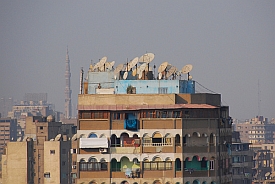For those of you not watching the Twitter feed (@FutureCon), I’ve been away on holiday for the last month and am just now getting back into the swing of things. So apologies for the lack of posts recently, but let’s start things off with a bang. Internet Kill Switches, how can we circumvent them?
Freedom of access to the global stream of consciousness that is the internet should be considered amongst the most important of human rights in this modern age where information is key to a completely integrated and flexible social experience. Ensuring that governments around the world have little ability to control how, where and when we access this fundamental right should be a priority for those consciously striving to uplift the world as a unified whole. With the current turmoil in Egypt, to name but one example (*cough* China *cough*), we have seen a very real and worrying example of just how much control nation states around the world are seeking to impose upon their citizens. Even though the move by the Egyptian government has seemingly been reversed in recent days, it brings up a very important issue that needs to be addressed publicly and vocally: just what can be done to overcome any attempt by governments around the world to instigate an ‘Internet Kill Switch’ in the future?
The answers are surprisingly easy and readily available (although I have to admit being a bit uneducated as to much of the technical aspects involved), showing that the internet is already well and truly out of the control of any single government. The problem comes from ensuring people are educated in how to access these connections rather than merely resorting to the easiest and most commonly available options such as broadband.
 Dial-Up
Dial-Up
How quickly we forget our humble beginnings. Dial Up connections are still available and widely used around the globe, and all you need access to is a landline with long distance capability to overcome any locally imposed internet blackout. As long as the long-distance phone lines are running (not always a certainty of course), you can get access to the internet.
This fundamental strength of the system was highlighted in Egypt and it is the ability for digital information to be sent over many different communication mediums that lies at the core of why it is so difficult for the internet to ever be completely taken away from us. The first port of call for any attempt to sever public access to the internet is to get out your old modems (presuming you still have one), or kit yourself up with a mobile-phone based connection, and get onto the phone lines – just like we used to!
Radio
It is also possible to run digital networks via radio waves – in fact, this is exactly what is happening in most of our households through the wireless networks that are increasingly ubiquitous. The question is: can something like this be set up on a larger, international scale? There are a number of interesting projects in this regard, although the majority of them are focused on relatively small localities such as a metropolitan city. However, with the right technological know-how and a large enough pool of participants to act as relay stations it is certainly possible to provide global network access purely through the use of radio-wave technology. An interesting example of this is SailMail, which seeks to provide email services to international waters through the use of technology specifically catered towards low-bandwidth/high-latency mediums such as radio or satellite. Leading us neatly onto our next category…
 Satellite
Satellite
Satellite internet has been available for some time now, and there are even moves to bring broadband speed access through a number of services mostly in the United States. Obviously, the infrastructure required for such a connection is considerable – more so than any other option really – but certainly not out of reach of numerous organisations that might wish to ensure globally accessible internet.
The ability to bring down such access (once the satellite is in place) is incredibly difficult, and means that anybody with the ability to procure or create a satellite dish will be able to circumvent any kind of internet kill switch that might be put into place. Given that we now have access to relatively cheap technology that can be used from any location, such as mobile satellite phones, this becomes an important part of the overall vision for a world in which the internet can never be unplugged.
Freedom ISPs
What is truly needed are non-profit, possibly even underground, organisations willing to produce the infrastructure necessary for global information clouds to perpetuate regardless of any co-ordinated attempt to stifle them. There are many different ways to accomplish this; some of which have been discussed right here, others that I have undoubtedly overlooked (such as the need to ensure a constantly accessible set of IP addresses), and even those that have yet to emerge. Through high-value individuals and organisations contributing their resources to such a cause, the viability of an internet kill switch becomes essentially impossible to enact completely.
It will require a great deal of money, knowledge and perseverance – but an internet that can never be shut down is essentially already here; all that is required now is to spread its presence and the ability for people in all areas of the globe to access it. Doing this will require a great deal of resources, both financial and otherwise, coming in from somewhere. The question now becomes who will step up to the task, and will they be able to withstand any attempt to bring them down.
 Public Protest
Public Protest
What must never be forgotten, and what is proving to be the case increasingly around the world, is that united the citizen population can always overcome any form of blatant state oppression and attempts to stifle the sharing of information. An important aspect of this is that a majority must be vocal and consistent with the message that political censorship of the internet should never play a role in any truly democratic and free society. This means not only being vocal when it is too late and the attempt is already underway, but early enough to make sure that such an eventuality is never even truly considered as an option because the backlash that would occur is already well known. What I’m talking about isn’t the kind of revolution that we are seeing in places such as Egypt, but rather a consistent and educated lobbying movement that hits home at the highest levels and has a vocal and erudite message to portray to the world’s media.
I’d love to hear from those of you better versed in the specifics of this technology, and please do correct any oversights or errors I may have made. In particular, it would be great to hear of any grassroot initiatives that are attempting to ensure such a human right continues to be accessible for the largest number of people possible. With current discussions even in the United States (self-proclaimed bastion of free speech) surrounding just how the internet could be muzzled, it is certainly more important than ever to ensure that as a collective we move faster and further than any oppressive elements are able to.
Thankfully, this already seems to be the case and the cat is well and truly out of the bag – but now those of us lucky enough to be assured such access need to consider how we might contribute to widening that access to the largest number of people around the world. The future of humanity depends a great deal on a collective source of information, debate and international organisation of people; so we must not become complacent and allow ourselves to ignore any attempt to take this unifying gift away from us.




